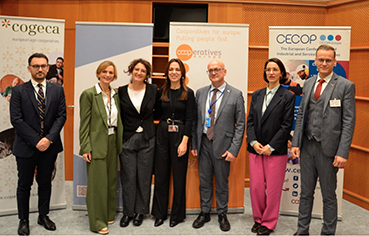Representatives of the European Parliament and leaders of the continent’s cooperative ecosystem met on 5 November at the Europarliament in Brussels to discuss the role of cooperatives in building a sustainable, competitive and inclusive Europe. This debate, part of the event entitled ‘Cooperative vision for a sustainable and competitive Europe: Priorities for the EU legislature 2024-2029’, was presented by MEP Irene Tinagli (S&D) and co-organised by CECOP and Cooperatives Europe with the support of REScoop, EACB, Euro Coop and COGECA.
The conference visualised the current role of the cooperative movement in the solution to the current problems and challenges in the EU. It also served as a stage for representatives of cooperatives from the agri-food and forestry, consumer, cooperative credit, industrial, service and renewable energy sectors to present their demands for the new legislature, placing particular emphasis on the importance of cooperatives in tackling Europe’s future socio-economic challenges.
CECOP President Giuseppe Guerini gave the opening speech, in which he said that the EU ‘must not only think about competitiveness, but also about attractiveness for people. Securing a Commissioner for Employment and Social Affairs is the first step to ensure a strong political commitment for the implementation of the European Social Economy Action Plan’.
‘Industrial cooperatives are a key component of European competitiveness that is often underestimated, while our contribution to strengthen the European model of sustainable development is crucial’, specified Guerini.
The priorities of European cooperatives
During the presentations, the need to accelerate the implementation of the Social Economy Action Plan, and to renew the Social Economy Intergroup in the European Parliament was introduced as one of the key and urgent priorities of the cooperative movement.
This intergroup plays a vital role in raising the voices of the cooperative movement and providing a platform to advocate for inclusive, sustainable and competitive economic policies.
In her speech, and in reference to this, Irene Tinagli MEP noted that while the social economy in Europe is a ‘growing and essential sector that contributes to economic resilience and social cohesion’, Parliament’s support is needed ‘to overcome financial barriers, legal obstacles and lack of institutional recognition’, and here, she continued, ‘is where parliamentary intervention plays a fundamental role’.
Among the main priorities is also the importance of building an EU legal framework adapted to the specificities of cooperatives, allowing them to operate in a proper way across Europe without compromising the positive externalities they have created over the years.
Expert panels
The event included two panel discussions. The first focused on the vision of the agri-food, forestry, retail and banking sectors, with the participation of Elli Tsiforou, Secretary General of Copa-Cogeca; Todor Ivanov, Secretary General of Euro Coop and Marco Mancino, Director of Prudential Affairs at the EACB.
The second panel covered the industry, services and renewable energy sectors, focusing the discussions on the role of cooperatives in innovation and transitions towards green energy.
This debate was opened, among other speeches, by Maravillas Abadía Jover MEP (EPP), who affirmed the need for greater recognition and support for cooperatives through flexible financing and legal recognition.







